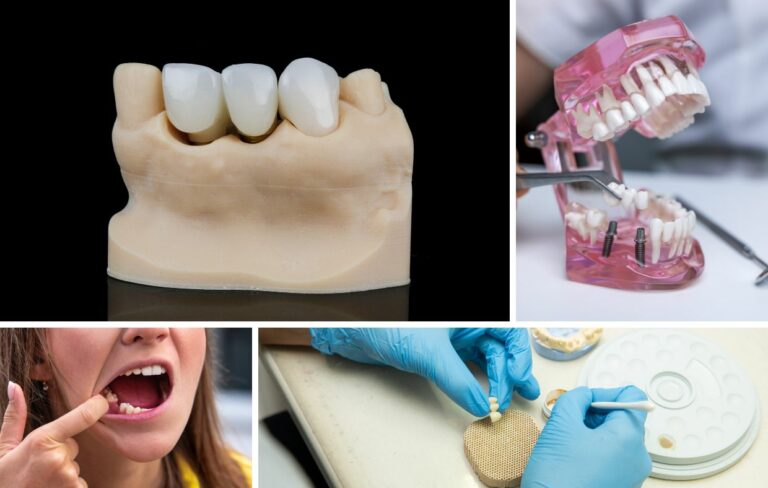Book Appointment Now

Dental Implants in Colombia: A Comprehensive Guide
Dental implants have revolutionized restorative dentistry, offering a permanent solution for missing teeth that looks, feels, and functions like natural ones. While this procedure is available worldwide, Colombia has emerged as a premier destination for individuals seeking high-quality dental implants at an affordable price. With advanced medical facilities, skilled dentists, and significant cost savings—up to 70% compared to the United States and Canada—Colombia combines excellent dental care with the opportunity to explore a vibrant country rich in culture and history.
Choosing to undergo dental implant surgery is a significant decision that can enhance your smile and improve your oral health. This comprehensive guide delves into the reasons why Colombia is an ideal choice for this procedure. It explores the benefits of dental implants, offers insights on selecting the right dental surgeon, and details what to expect throughout the process—from preparation to recovery. Whether you’re considering dental implants to restore functionality or to boost your confidence, this guide provides all the information you need to make an informed decision.
What Are Dental Implants?
Dental implants are artificial tooth roots made from biocompatible materials, typically titanium. Surgically placed into the jawbone, they serve as a sturdy foundation for replacement teeth, including crowns, bridges, or dentures. The implant integrates with the bone through a process called osseointegration, providing stability that closely resembles that of natural tooth roots.
A dental implant consists of three main components:

- Implant (Artificial Root): A titanium post inserted into the jawbone, acting as the root of the new tooth.
- Abutment: A connector that attaches to the implant and holds the replacement tooth or crown.
- Crown: The visible part of the tooth, custom-made to match your natural teeth in shape and color.
An implant consists of three main components. First is the implant itself—a titanium post that is inserted into the jawbone. Next is the abutment, a connector that attaches to the implant and holds the replacement tooth or crown. Finally, the crown is custom-made to match your natural teeth in shape and color, completing the restoration both functionally and aesthetically. By integrating with the bone, dental implants prevent bone loss and maintain facial structure, offering a long-lasting solution that, with proper care, can last a lifetime.
What Materials Are Dental Implants Made From?
Dental implants are primarily made from titanium, a metal known for its strength, durability, and compatibility with human bone. Titanium’s ability to fuse with bone tissue makes it an ideal material for the implant’s root component. In some cases, zirconia (a type of ceramic) is used, especially for patients with metal sensitivities. The crowns attached to the implants are usually made from porcelain or ceramic materials that mimic the appearance and translucency of natural teeth.
Why Choose Dental Implants in Colombia?
Opting for dental implants in Colombia offers a blend of affordability, quality, and professional expertise that is hard to match elsewhere. The cost savings are significant, with procedures being up to 70% cheaper than in the United States or Canada. This affordability is due to lower living and labor costs in Colombia, allowing clinics to offer competitive prices without compromising on quality.
Colombian dentists are highly trained professionals who often hold degrees from prestigious universities and have undergone rigorous education and training programs. Many have international experience and keep abreast of the latest advancements in dental technology and techniques. Clinics are equipped with modern technologies, such as 3D imaging and computer-aided design/manufacturing systems, which enhance the precision and success of implant procedures.
Beyond the financial and professional advantages, Colombia offers an excellent patient experience. Many clinics cater to international patients, providing English-speaking staff and personalized care. They often assist with travel arrangements and accommodations, ensuring that your journey is as comfortable as possible. Additionally, the opportunity to explore Colombia’s rich culture, beautiful landscapes, and warm hospitality adds an extra dimension to your dental tourism experience.
What Are the Benefits of Dental Implant Surgery?
Dental implant surgery offers numerous advantages over traditional tooth replacement options:
- Improved Appearance: Implants look and feel like your own teeth, enhancing your smile and restoring confidence.
- Enhanced Oral Function: They restore full chewing ability, allowing you to eat your favorite foods without pain or difficulty.
- Durability: Designed to last many years, potentially a lifetime with proper care.
- Bone Preservation: Prevent bone loss by stimulating the jawbone, maintaining facial structure.
- Adjacent Teeth Preservation: Do not require altering neighboring teeth as bridges do, preserving overall oral health.
- Improved Speech: Eliminate slurring or mumbling that can occur with ill-fitting dentures.
- Convenience: Remove the discomfort and inconvenience of removable dentures.
Clinical studies on real patients show about 95% of patients are satisfied with their new artificial teeth. Studies also indicate a success rate of around 98% for dental implants, making this treatment a reliable and effective solution.
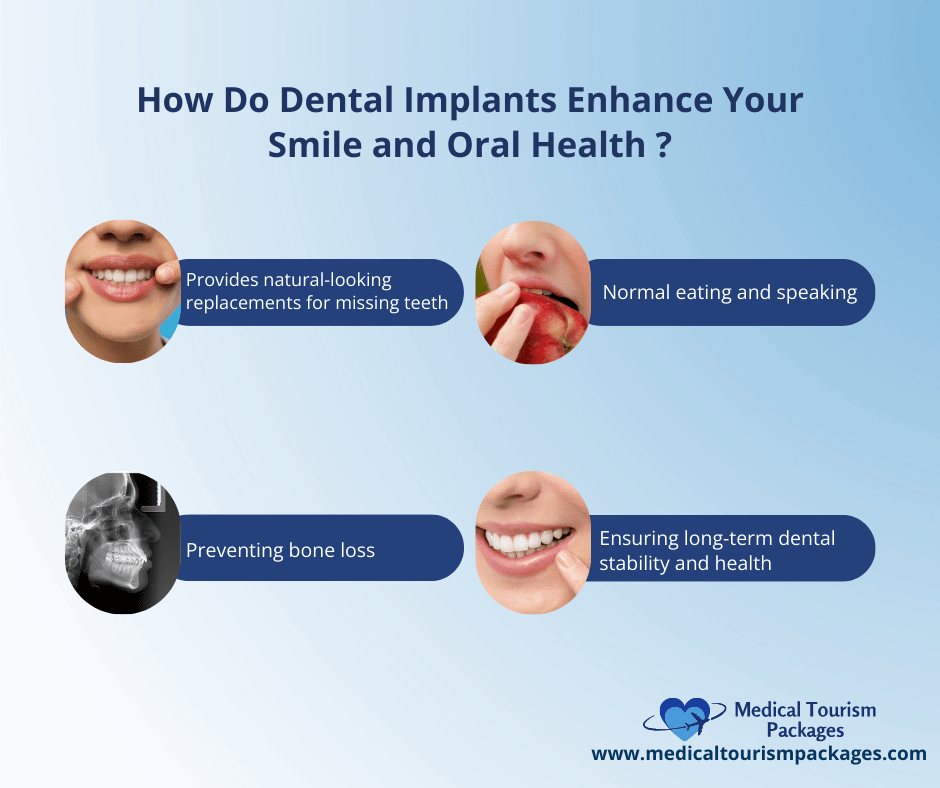
How Do Dental Implants Enhance Your Smile and Oral Health?
Dental implants play a crucial role in restoring both the aesthetics and functionality of your mouth:
- Natural Look and Feel: Custom-made crowns ensure that your implants blend seamlessly with your natural teeth.
- Preventing Bone Loss: By replacing tooth roots, implants stimulate the jawbone, preventing bone deterioration.
- Maintaining Facial Structure: Preventing bone loss helps maintain the natural shape of your face, avoiding a sunken appearance.
- Preserving Healthy Teeth: Implants do not require grinding down adjacent teeth as bridges do, preserving your natural tooth structure.
- Improved Oral Hygiene: Easier to clean than bridges, implants reduce the risk of periodontal disease.
What are Psychological and Emotional Benefits of Dental Implants?
Beyond the physical advantages, dental implants offer significant psychological and emotional benefits. The restoration of your smile can greatly enhance your self-esteem and confidence, positively affecting both your personal and professional life. Many patients report a notable increase in quality of life after receiving implants, as they no longer feel self-conscious about missing teeth or worry about dentures slipping during conversation or meals.
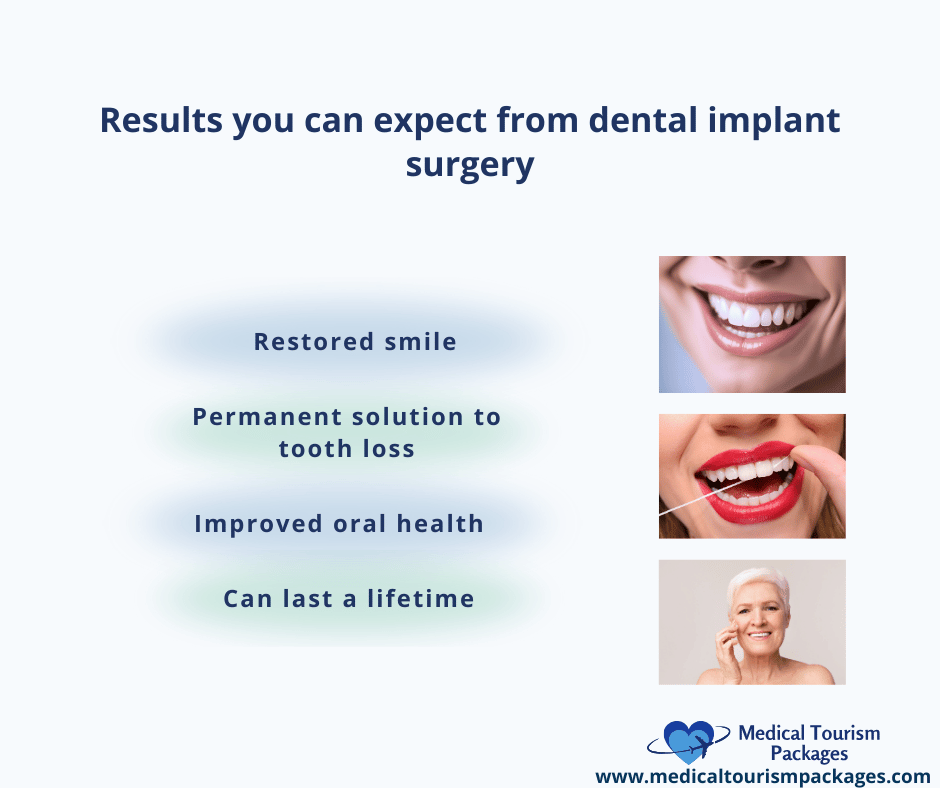
The stability and comfort provided by dental implants allow for more natural interactions and expressions. You can laugh, speak, and eat with confidence, without the limitations or discomfort associated with removable dentures. This newfound assurance can lead to increased social engagement and a more active lifestyle, contributing to overall emotional well-being and a renewed zest for life.
How Do You Choose the Right Dental Surgeon in Colombia?
Selecting the right dental surgeon is crucial to the success of your dental implant procedure. In Colombia, dentists undergo extensive training, including a comprehensive five-year curriculum and an additional year of public service, earning a Doctorate of Dental Surgery. Many further specialize in areas such as implantology or oral surgery, and some pursue additional studies abroad to enhance their expertise.
When choosing a dental surgeon, consider their qualifications and certifications. Look for affiliations with professional organizations like the Colombian Dental Federation or the International Congress of Oral Implantologists, which indicate a commitment to excellence and ongoing education. Experience is equally important; a dentist with a solid track record in implant surgery and positive patient reviews is more likely to deliver successful outcomes.
Assessing the technology and techniques used by the clinic can also provide insight into the quality of care you will receive. Modern clinics utilize advanced equipment such as 3D imaging and computer-aided design systems, which enhance precision during surgery. Additionally, clear communication is essential. Ensure that the dental team speaks your language or offers translation services, and that they provide a thorough consultation process to address all your concerns and questions.
Types and Techniques of Dental Implants
Colombia offers a range of dental implant types and techniques to accommodate various patient needs. The most common type is the endosteal implant, which is inserted directly into the jawbone. This option is suitable for most patients with adequate bone density. Subperiosteal implants, placed under the gum but above the jawbone, are an alternative for those who lack sufficient bone height. For patients with severe bone loss in the upper jaw, zygomatic implants anchored in the cheekbone may be recommended.
Different techniques are employed based on individual cases. Single-tooth implants replace individual missing teeth, while the All-on-4 or All-on-6 methods support a full arch of teeth using four or six implants, respectively. Implant-supported overdentures offer a removable solution that snaps onto implants for enhanced stability. Mini implants, which are smaller in diameter, can be used in cases with limited bone density or space.
Your dental surgeon will assess your specific situation to determine the most appropriate type and technique, ensuring that the treatment plan aligns with your needs and goals.
What are the Types of Dental Implants?
The types of dental implants are:
- Endosteal Implants: The most common type, inserted directly into the jawbone.
- Subperiosteal Implants: Placed under the gum but above the jawbone, suitable for patients lacking sufficient healthy bone.
- Zygomatic Implants: Anchored in the cheekbone, used when the upper jawbone is insufficient.
What are the Implant Techniques?
The types of implant techniques are:
- Single-Tooth Implants: Replace individual missing teeth.
- All-on-4 or All-on-6 Implants: Support a full arch of teeth with four or six implants.
- Implant-Supported Overdentures: Removable dentures that snap onto implants for stability.
- Mini Implants: Smaller in diameter, used in cases with limited bone density.
How Is Dental Implant Surgery Performed in Colombia?
Undergoing dental implant surgery in Colombia involves several carefully planned steps to ensure a successful outcome. The process begins with a thorough initial consultation, during which the dentist conducts a comprehensive evaluation of your dental health. This includes dental exams, X-rays, and 3D imaging to assess bone structure and plan the implant placement accurately.
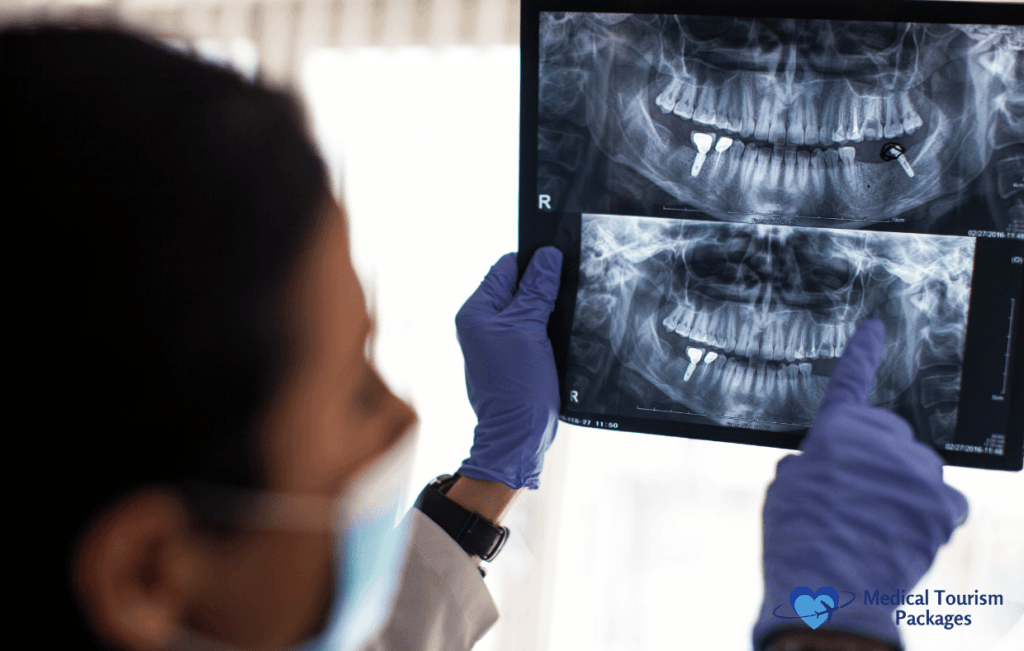
Preparation may involve addressing any existing dental issues, such as decay or gum disease, and could include tooth extractions or bone grafting if necessary. The implant placement itself is performed under anesthesia to ensure comfort. The dentist surgically inserts the titanium implant into the jawbone, and then the healing process begins. Over the next three to six months, osseointegration occurs as the implant fuses with the bone.
After healing, an abutment is attached to the implant, and impressions are taken to create the custom-made crown. Once the crown is fabricated, it is affixed to the abutment, completing the restoration. The entire process may span several months, but this timeline ensures the stability and longevity of the implant.
Pre-Operative Assessments and Dental Examinations
- Comprehensive Evaluation: Dental exams, X-rays, and 3D imaging assess bone structure and plan implant placement.
- Treatment Planning: A personalized plan is developed, considering the number of implants and any additional procedures needed.
- Laboratory Tests: Blood tests and other assessments ensure you’re a suitable candidate.
Anesthesia Options Used in Dental Implant Surgery
- Local Anesthesia: Numbs the surgical area; you’re awake but feel no pain.
- Sedation Dentistry: Options like oral sedatives, nitrous oxide, or intravenous (IV) sedation help you relax.
- General Anesthesia: Used for extensive procedures, though less common.
Step-by-Step Process of Dental Implant Surgery
- Initial Consultation: Assessment and personalized treatment planning.
- Preparation: May involve tooth extractions or bone grafting.
- Implant Placement: Surgical insertion of the implant into the jawbone under anesthesia.
- Healing Period: Osseointegration over three to six months as the implant fuses with bone.
- Abutment Placement: After healing, an abutment is attached to the implant.
- Crown Placement: A custom-made crown is affixed to the abutment.
Preparing for Dental Implant Surgery
Proper preparation is essential for a smooth surgical experience and optimal healing. Begin by providing your dentist with a complete medical history, including any medications and health conditions. Address any existing dental issues prior to the procedure to reduce the risk of complications.
Lifestyle adjustments can significantly impact the success of your surgery. If you smoke, it’s advisable to quit at least one week before the procedure, as smoking can hinder healing and increase the risk of implant failure. Reducing alcohol intake and adopting a healthy diet rich in nutrients can also promote better recovery.
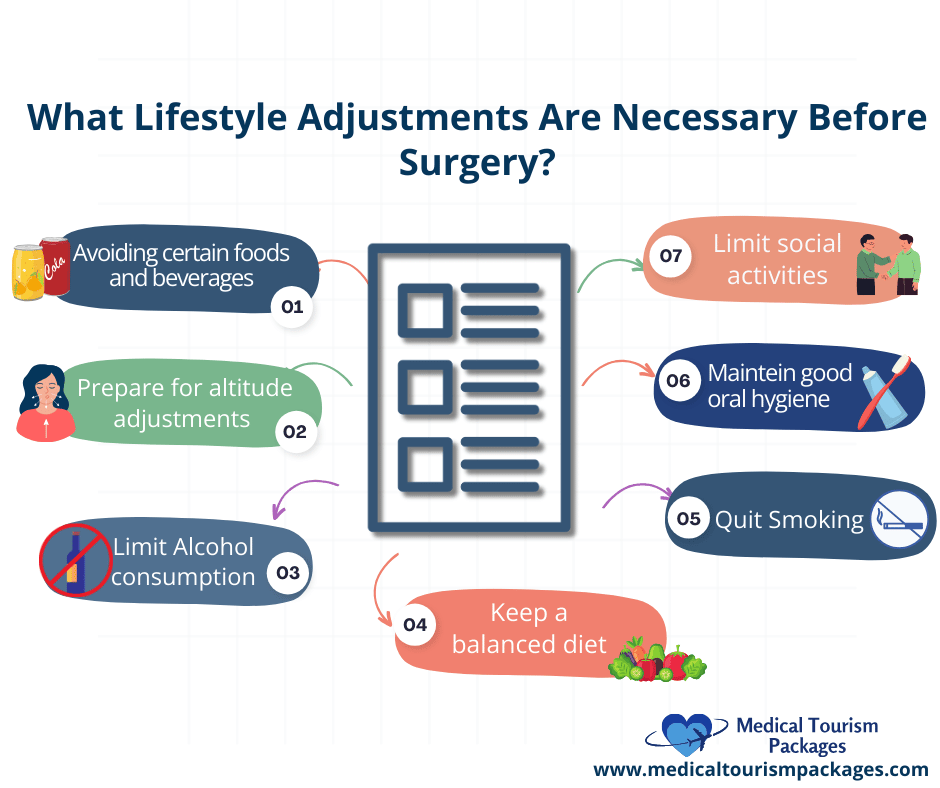
Follow any pre-operative instructions provided by your dentist. This may include guidelines on medications, fasting requirements if sedation is planned, and arranging for transportation home after the procedure. Ensuring that you are well-prepared can help alleviate anxiety and set the stage for a successful outcome.
Recovery Process and Post-Operative Care
After the surgery, the recovery process is crucial to the success of your dental implant. Immediate post-operative care involves managing swelling and discomfort. Applying ice packs can reduce swelling, and prescribed pain relievers can help manage pain. It’s important to rest and avoid strenuous activities for a few days to allow your body to heal.
Maintaining good oral hygiene is essential, but care must be taken around the surgical site. Gentle rinsing with an antiseptic mouthwash can keep the area clean without causing irritation. Your dentist may recommend a soft diet for the first few days, gradually reintroducing firmer foods as healing progresses.
Attending follow-up appointments is important to monitor healing and address any concerns. The dentist will check the implant site to ensure proper osseointegration is occurring. Full healing and integration typically take three to six months, after which the final crown can be placed.
Avoiding smoking and limiting alcohol consumption during recovery can significantly improve healing outcomes. By adhering to your dentist’s instructions and taking care of your health, you can contribute to the long-term success of your dental implant.
What are the risks of Dental implants in Colombia?
While dental implant surgery boasts a high success rate of around 98%, potential risks include:
- Infection at the Implant Site: Prevented with good hygiene and antibiotics.
- Injury to Surrounding Structures: Including adjacent teeth or blood vessels.
- Nerve Damage: May cause pain, numbness, or tingling.
- Sinus Problems: For implants in the upper jaw that protrude into sinus cavities.
- Implant Failure: Rare instances where the implant doesn’t integrate with the bone.
Certain factors can increase the risk of complications, such as smoking, poor oral hygiene, and chronic health conditions like diabetes. Choosing an experienced dental surgeon and following pre- and post-operative care instructions can minimize these risks. Your dentist will discuss any potential concerns with you during the consultation and help you make an informed decision.
Which cities to travel for Dental Implants in Colombia?
The best cities to travel to for dental implants in Colombia are Bogotá and Medellín, both known for their high-quality dental care and modern clinics.
Dental Implants in Bogotá are a popular choice due to the city’s advanced dental facilities and experienced specialists, many of whom have international training. The capital offers a wide range of implant options at competitive prices, making it a top destination for dental tourism.
Similarly, Dental Implants in Medellín attract many international patients thanks to the city’s reputation for excellent healthcare, modern clinics, and affordable treatment costs. Medellín’s pleasant climate and efficient transportation make it an appealing option for those seeking both quality dental care and a comfortable recovery.
Traveling to Colombia for Dental Implant Surgery
Planning your trip to Colombia for dental implant surgery involves several steps to ensure a smooth experience. Begin by researching and selecting a reputable clinic with experience in treating international patients. Many clinics offer online consultations to discuss your needs and develop a treatment plan.
Check visa requirements for your country; many travelers can enter Colombia without a visa for stays up to 90 days. Book flights to major cities like Bogotá, Medellín, or Cali, where top dental clinics are located. Direct flights are available from many international airports, making travel convenient.
Arrange accommodations near the clinic for ease of access to appointments. Some clinics may offer assistance with travel and lodging arrangements. Plan for adequate recovery time, and consider combining your dental treatment with the opportunity to explore Colombia’s rich cultural and natural attractions.
Obtaining comprehensive travel insurance that covers medical treatment abroad is advisable to protect against unforeseen circumstances.
Frequently Asked Questions on Dental Implants
How Much Does a Tooth Implant Cost in Colombia?
The cost of a tooth implant in Colombia typically ranges from $1000 to $2000 USD per implant, including the implant, abutment, and crown. This represents substantial savings compared to the United States and Canada, where a single implant can cost between $3,000 and $5,000. Additional costs may apply for procedures like bone grafts or sinus lifts.
What country is the cheapest to get dental implants?
Colombia is among the most affordable countries for dental implants, offering significant cost savings without compromising on quality.
Is it safe to get dental implants in Colombia?
Yes, when performed by experienced dental surgeons in reputable clinics that adhere to international standards.
Does Colombia Have Good Dental Care?
Colombia has excellent dental care, with many clinics offering world-class services. The country’s dental professionals are highly trained, and clinics are equipped with modern technologies. Dental tourism is a growing industry in Colombia, with clinics catering to international patients by providing high-quality treatments at affordable prices. The combination of skilled dentists, advanced facilities, and cost savings makes Colombia an attractive destination for dental care.
How long does recovery from dental implant surgery take?
Initial healing takes a few days to a week, with complete osseointegration of the implant into the jawbone occurring over three to six months.
What Makes a Bone Unsuitable for a Dental Implant?
A bone may be unsuitable for a dental implant if it lacks sufficient density or volume to support the implant securely. Factors contributing to inadequate bone include prolonged tooth loss leading to bone resorption, periodontal disease, trauma, or congenital defects. In such cases, additional procedures like bone grafts or sinus lifts may be necessary to rebuild and strengthen the bone.
What Are Bone Grafts, and How Do They Work?
Bone grafts involve transplanting bone tissue to augment insufficient jawbone structure. The graft can be taken from another area of your body, obtained from a donor, or made from synthetic materials. Over time, the grafted material stimulates new bone growth, providing a solid foundation for the dental implant. This procedure enhances the success rate of implants in patients with inadequate bone density.
What Is a Sinus Lift?
A sinus lift is a surgical procedure that adds bone to the upper jaw in the area of your molars and premolars. The sinus membrane is moved upward (lifted) to make room for the additional bone. This procedure is necessary when there isn’t enough bone height in the upper jaw or the sinuses are too close to the jaw for implants to be placed. A sinus lift increases the amount of bone available for successful implant placement.
Choosing Colombia for your dental implant surgery offers a unique combination of affordability, quality, and professional expertise. With advanced facilities, skilled dental surgeons, and significant cost savings, you can achieve a restored smile and improved oral health at a fraction of the cost elsewhere. By carefully selecting a qualified dentist and adhering to all pre- and post-operative instructions, you can look forward to a successful procedure and the many benefits that dental implants provide.
Clinical studies show high satisfaction rates among patients who have received dental implants, reflecting the effectiveness and reliability of this treatment. With proper care and maintenance, dental implants can last a lifetime, enhancing not only your smile but also your quality of life.

